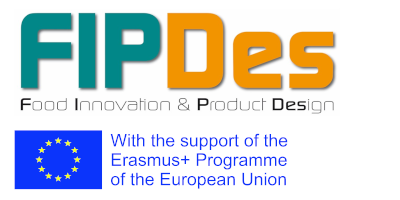
What is FIPDes?
The Erasmus Mundus Joint Master Degree FIPDes is a 2-year Programme in Food Innovation & Product Design
It is the 1st course created to tackle the global challenges of food innovation along with product design and packaging.
FIPDes is:
- 65 high quality teachers and researchers
- 25 international guest speakers
- 10 research centers
- 7 incubators and technologic halls
- 3 experimental kitchens
- 10 different scientific fields
- 40% practical, experimental and project work
A consortium of 4 top-ranking European Universities:
- Université Paris Saclay and AgroParisTech - France
- Technological University Dublin, former Dublin Institute of Technology - Ireland
- University of Naples Federico II - Italy
- Lund University - Sweden
These universities, amongst the oldest and most prestigious institutes in Europe, offer this truly integrated and unique programme, adopting a holistic and cross-disciplinary approach: from initial conception through prototypes to consumption, from raw materials to packaged goods.
The following scheme illustrates the international mobility cycle. During the semester 1 the students attend altogether courses in Paris, France. In the semester 2 they move to Dublin, Ireland. Afterwards students attend a summer school and an optional summer internship. For the semester 3 students specialize in one of the three options: France, Sweden or Italy. During the semester 4 students carry out the Master Thesis according to their specialization. The FIPDes Master concludes with a graduation ceremony integrated in the FIPDes Week, which is the introduction week for the new cohort.
FIPDes students study, live and get professional experience in four different EU countries. They benefit from the most competitive and innovative learning environments, based on participative learning, team work, R&D projects and hands-on trainings in collaboration with pioneering research, culinary & industrial laboratories.
FIPDes is training a new generation of food professionals capable of working across borders, with an inclusive vision of innovation to create sound, sustainable and healthy food solutions for the future generations on this planet.
After 12 years, FIPDes is fast becoming the worldwide reference in its field with a visibility spread over more than 100 countries, students & alumni of more than 70 different nationalities and a global network of socio-economic and research partners from the 5 continents.
“The strong scientific character together with the business (managerial and marketing) approach and hands-on learning along the entire program it’s certainly unique. You will have access to fully equipped professional kitchens, helped by top professional chefs, and the most advance research labs. You will carry out projects proposed by leading food Companies working side by side with them in interdisciplinary groups. In addition, you will live in different European countries and will share amazing experiences with students from all over the world.”
Alberto G. (FIPDes graduate 2011-2013)
“I’m continuously grateful for the experience FIPDes has given me. I’m incredibly thankful for the programme you all have worked so hard to build, bringing us together from across the globe; it’s opened so many doors for all of us!”
Katy C. (FIPDes graduate 2014-2016)
"This Programme offers you a high quality training, a worldwide employability, new friends for life, self-confidence and a great experience you don’t get if you would stay comfortably at home."
Hervé This (INRAE, associate FIPDes partner)

(Hervé This with FIPDes students)
FIPDes received 2 labels from the EACEA in 2018
FIPDes has been labelled as "Success story" and as "Good practice example" by the European Commission.
Thanks to the “Success story” label, the EACEA created this special video for FIPDes:
This project has been funded with the support from the European Commission. This communication reflects only the views of the author, and the Commission cannot be held responsible for any use which may be made of the information contained therein.
- Updated October 2023 -



